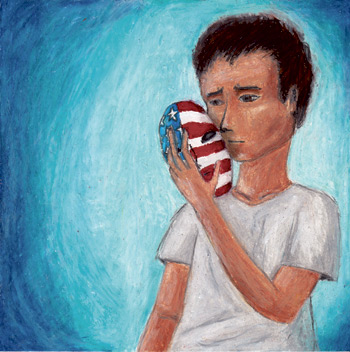Do I belong here?
One night at the end of ninth grade, my family and I were waiting for the bus near USC. My parents were happy because we had just seen a documentary my older sister was in about a garden in South Central. Our good mood ended when three white boys drove by slowly and screamed out of their car window a racial insult that I think was “wetback” and flipped us off. I wanted to yell at them but I was afraid they’d stop the car and start beating us. It made me think of African Americans who were lynched in the 1900s, and I was scared. My mom said “niños pendejos” (stupid boys) to the air. They had ruined a good night.
This was the first time I had faced racism and it made me wonder if people looked down on Latinos. But I didn’t find out why until 10th grade, when my class did a project on stereotypes in the media. That day our teacher was talking about the stereotypes of different people. We learned the stereotypes about Mexicans: that they are poor and lazy. I didn’t know that was how a lot of people saw us. My mom would always tell me to work hard and get my education so I wouldn’t become a dropout. I thought it was just my mom’s way of motivating me. But now I realized that she didn’t want me to end up like the Latino students in my neighborhood who don’t go to college. I suddenly realized what Latino students meant when they teased one another by saying, “You’re such a Mexican.” At lunch if someone said, “I ate this delicious torta” another Latino would say, “Oh you’re such a Mexican.” They were basically saying it sucks to be a Mexican. I wished I weren’t a Latino with brown skin.
Before I learned about stereotypes, the image I had of myself was of a student who liked to play soccer and listen to music. I thought that I was like everybody else; I didn’t consider race or its importance. The new image I had of myself was of a “Mexican” who is unsuccessful and stupid.
I tried to get rid of my accent
I was ashamed of who I was. I stopped wearing my Mexico soccer jersey and just left it in my drawer. I didn’t want an accent because I thought it made me sound less intelligent. Once I told my mom that I was only going to talk to her in English. I thought that if I talked only in English, I would lose my accent. For a few hours I talked to her in English, saying “Why?” and “When will the food be ready?” instead of “Por qué?” and “Cuándo va a estar la comida lista?” But my mother couldn’t understand what I was saying so I gave up and continued talking with her in Spanish. I also read books out loud in English because I thought it would help me lose my accent, but it didn’t help because I was just reading in my accent with no one correcting me.
At the time, a few of my Latino classmates called me “beaner.” I had thought they called me that because I liked Mexico. But when I learned about stereotypes, it was embarrassing because it meant somebody who was a failure. I wondered if they understood what beaner meant. I wanted them to use my name but I thought people would think I was overreacting so I didn’t stand up for myself. It wasn’t until 11th grade that I told people to stop calling me that. When other Latino students started using it too, I decided it had to end. I told them white people invented that word to look down on Mexicans. After that they stopped calling me beaner.
I thought that it would be hard for me to be successful because I am a Latino and people look down on them. My school required students to interview eight people who work in the field they have an interest in. In 10th grade I was interested in microbiology. I was excited about my project. I thought that I would be able to use a microscope to look at microbes. But when I called scientists to schedule an interview, I thought that I was not going to be taken seriously. I thought that my accent made me sound stupid. When I’d ask if I could interview them most of them said, “No, I’m busy.” Looking back now, I’m pretty sure they were busy, but I thought that my accent was the reason those scientists didn’t want to talk to me.
I managed to get two interviews but I stopped trying to get more because I wasn’t motivated. During the interviews I was conscious of my accent and I stuttered, which I thought made me sound unprofessional and unprepared. The scientists answered all of my questions and showed me around the lab. They were being nice so I thought maybe my accent didn’t matter and that helped me relax.
Other mexicans made fun of me
Being called a failure by another Latino made me believe that I was going to be failure. One day in 11th grade we were having a group discussion in history class. Two kids at my table were insulting another kid, telling him he looked like someone who sells gum on the streets. I was staring because they were being rude when the kid next to me said, “You look like one of those Mexicans who sells food on the Metro.” I saw the people at the table laughing at me and I felt embarrassed. I told him that he was also Mexican. He said, “I don’t look as Mexican as you.” I was confused. Was it his light skin that made him less of a Mexican and more American?
That was the first time I’d heard someone say I don’t look as Mexican as you. Could it be that the people who succeed in this country are those who look American? I hated these thoughts. It made me wonder if I belonged in the United States. It made me wish that I were a different race. It made me lose confidence in myself.
Toward the end of 11th grade I started to realize that not everyone was looking down on me. For a school project, I chose to write restaurant reviews. When I went to a restaurant in Little Armenia, it was just me and another table of white people. “Oh wow,” I thought, “This place looks fancy and expensive. I don’t belong.” As soon as I sat down, I started to sweat even though it wasn’t that hot. I took off my jacket.
I saw the waiter talking to the chefs and I thought they were judging me. I kept thinking, “Are they going to serve me?” But I didn’t leave because I had to write a review. Minutes later, the waiter stopped talking with the chefs and took my order. He was happy to serve me and asked me if I needed anything else. I ordered frog legs and when I finished eating I saw the owner and I knew I had to talk to him for my project. I started asking him questions about his restaurant and I guess that he liked that because he gave me a free baklava. After I left the restaurant, I thought, “That wasn’t bad at all.” I was just overreacting because of my past experiences.
As I went to more restaurants, I felt more confident and I wasn’t as nervous. It helped me realize that not all people think of me as a failing Latino. Now I take my friends and family to most of the restaurants I have visited.
Also in 11th grade my class read I Know Why the Caged Bird Sings by Maya Angelou. Growing up in the 1930s, Angelou doesn’t like herself because she is African-American. She does not like her “nappy” hair and dark skin. In the book she is trying to discover who she is as an African-American woman and starts to accept herself more at the end. She looks at her grandmother as a strong, successful African-American woman. She owned her own shop and one time she stood up to a white dentist who wouldn’t help Angelou when she had a bad tooth. It felt like I was going through the same thing as her. It made me realize I’m not the only person who struggles to feel accepted and that I can get over it.
One day my teacher asked the class to share what they thought was the most important thing for a person to succeed in education: getting support from your family, economics or handling stereotypes and racism. I was the only person who chose handling stereotypes and racism because it had affected me. I said that facing stereotypes and racism was most important because if you don’t know how to handle it, you won’t have the confidence to succeed—like when I thought that my accent ruined my chance of getting an interview. The fact that that choice was listed helped me realize that it’s something that a lot of people face. It made me feel normal.
Becoming a leader at school gave me confidence
While I was running for school president my senior year, I wasn’t sure I was going to win. But I told myself that to be successful I have to stop looking down on myself. When I won, I realized that I can be successful and people like to listen to good ideas.
Before, I was trying to be more American by getting rid of my accent. Now I realize that speaking Spanish doesn’t make me less of a person. It means I’m more educated because I can speak two languages and I should practice it more instead of trying to forget it. I read the Spanish newspaper La Opinión to find out what’s going on with immigration policies and to practice my Spanish.
I know I can be successful because it’s me who gets to make that choice. My plan is to attend college. I want to prove to people who think that Latinos are failures that we can be successful. I do belong in the United States. An American is a person who overcomes struggles to become successful and that is what I’m doing.






